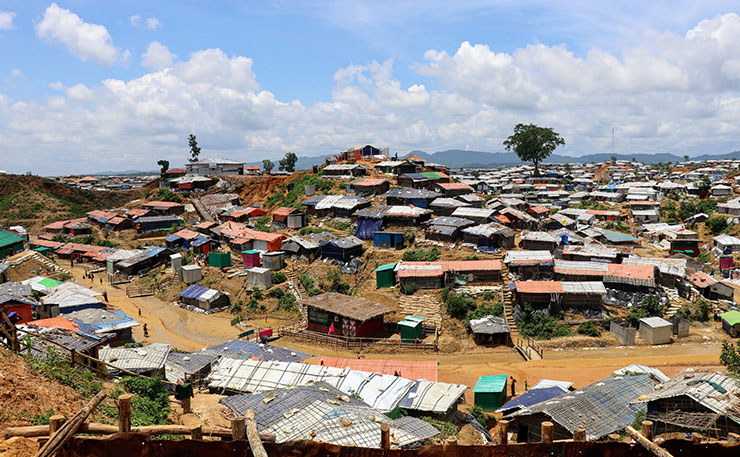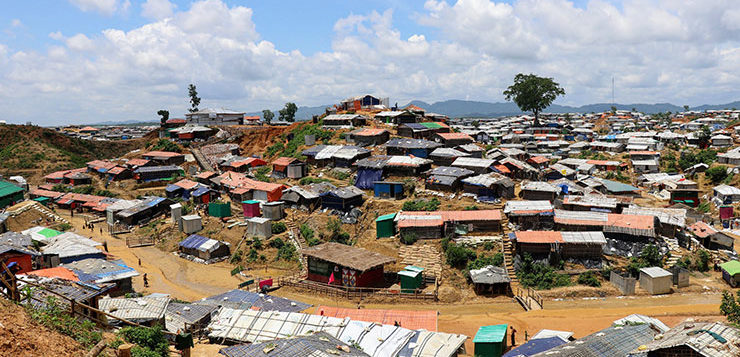Australia has an obligation to assist one of the world’s most persecuted minorities, writes Orla Murphy from Plan International.
As children around Australia settle into a new school year, in Cox’s Bazar, Bangladesh, hundreds of thousands of Rohingya refugee children are struggling to get an education.
Nearly a year and a half has passed since a brutal military crackdown in Myanmar saw some 730,000 people from the ethnic minority group flee into neighbouring Bangladesh.
It’s estimated that there are now 921,000 Rohingya refugees in Cox’s Bazar – and over half are children.
It may not attract much media attention, but education for children caught up in emergencies and crises is absolutely critical.
For Rohingya children, it provides not just an opportunity for learning, but hope for the future at a time when there remains massive anxiety around the possibility of being forced to return to Myanmar. Bangladesh and Myanmar had announced that repatriations would commence last November – despite United Nations investigators reporting “ongoing genocide” against the Rohingya in Myanmar. Plan International is among a coalition of international NGOs that have called on the governments of Bangladesh and Myanmar to stand by their commitments that the repatriation of refugees would only happen if it is safe, voluntary and dignified.
Our research shows that in times of crisis, adolescent girls in particular face numerous barriers to accessing education and learning opportunities, among many other serious threats. Our team working on the ground in Cox’s Bazar sees the challenges girls face there every day.
They tell us one of the biggest threats to girls’ education is early marriage.
Families’ fear for their daughters’ safety in the camps could be contributing to the high rate of early marriage. Plan International’s research Adolescent Girls In Crisis showed that when families are under pressure and lose livelihoods in times of crisis, the risk of forced child marriage increases. A 2018 Population Council study that looked into the rise of child marriage among the Rohingya in Cox’s Bazar found limited access to health services and contraceptives and the absence of well-defined laws and legal processes around documenting marriages in the camps were fuelling the practice, alongside cultural beliefs.
In the severely congested camps of Cox’s Bazar, adolescent girls are also vulnerable to gender-based violence, sexual harassment, forced prostitution, and trafficking. Amid all these threats, and the fear they create, Rohingya girls are largely confined to their tents.
While the physical restriction of adolescent girls in the camps is an obvious barrier to education, it’s not the only one they face. The Rohingya also cite the lack of female teachers, separate bathrooms for girls and access to clean water – a key concern for the health and dignity of girls who are menstruating. There is also a lack of formal education and learning opportunities for older children, and barriers stemming from the cultural perception of the value of educating girls.
On top of that, adolescent girls are taking on extra household and economic responsibilities for their families, which can prevent them from attending the learning centres that international development organisations, including Plan International, have set up.
All of this leaves us in a deeply challenging and troubling situation.
There is a massive gap in education activities being provided to adolescent Rohingya girls in Cox’s Bazar – a shocking 2% of adolescents, aged between 15 and 24, are accessing education services in the camps, according to the Joint Response Plan For Rohingya Mid-Term Review.
The majority of Rohingya girls are not attending learning centres. Available data shows an alarming spike in the dropout rate among girls, once they reach 11 to 13.
At the same time, we know the girls are passionate and eager to get an education. Many faced limited access to education in Myanmar – most Rohingya people are not counted as citizens in Myanmar, and don’t have identification documents.
As one 18-year-old woman in Cox’s Bazar told us: “If we were allowed to, all of us would have studied.”

Faced with this situation, our team on the ground has designed innovative ways to bring education to where the girls are in the camps. For girls who can’t go to a learning centre, our team has introduced home-based education, such as Outreach Tutoring and Big Brother-Big Sister approaches.
For girls, education brings hope and empowerment. It brings lower rates of early marriage and pregnancy, as well as gender-based violence. Moreover, education provides girls with the opportunities they need, so they can grow up to achieve their dreams.
This is why the massive gap in education for Rohingya youth in Cox’s Bazar is so frustrating. Every child, no matter their gender or location, has the right to education – and we all have a duty to ensure they can receive it.
The international community, including Australia, has been generous in supporting the Rohingya refugees. Yet, the total funding for education stood at $13 million as of September 2018, according to the Mid-Term Review – that’s just 28% of the $47 million that’s needed to provide education to the hundreds of thousands of children in the camps.
International development agencies are working hard on the ground to provide education to every refugee child in Cox’s Bazar. But we can only do so much with the resources we have.
Donors, including the Australian government, need to ensure this crisis isn’t forgotten. We need to support the needs of all Rohingya refugees, and work with international partners and Myanmar to ensure a safe and dignified return for those who want to go back to their homes.
Rohingya refugee children deserve education, as all children do. If we don’t deliver it, we will miss out on the opportunity we have to give them the best chance to grow into tomorrow’s leaders.
Donate To New Matilda
New Matilda is a small, independent media outlet. We survive through reader contributions, and never losing a lawsuit. If you got something from this article, giving something back helps us to continue speaking truth to power. Every little bit counts.




